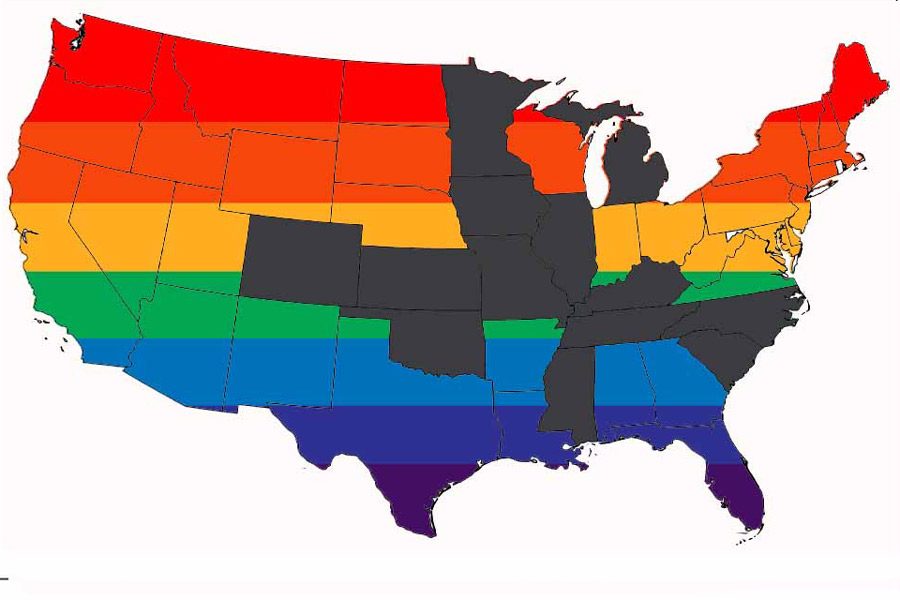States pass LGBT legislation
Across the U.S., 13 states, indicated above by gray, have enacted laws similar to the ones in Mississippi and North Carolina. Nine states have passed “Bathroom Bills” that require individuals to use the bathroom of the sex they were born as, while seven states have “religious freedom protection acts” that allow individuals to refuse service and employment based on their belief or conduct.
States across the country, including Mississippi, North Carolina, and others, have passed laws to “protect religious freedom” that have been deemed discriminatory by the LGBT community.
On April 7, the state of Mississippi passed a law titled “Protecting Freedom of Conscience from Government Discrimination Act,” which has received backlash for encouraging prejudice against LGBT people.
The act was created to preserve the religious freedom of Mississippi citizens. It protects the, “sincerely held moral conviction that marriage is or should be recognized as the union of one man and one woman; sexual relations are properly reserved to such a marriage; and male or female refer to an individual’s immutable biological sex as objectively determined by anatomy and genetics at time of birth,” according to the official legislation passed.
The bill allows Mississippi employers to fire and refuse to hire individuals whose lifestyle or beliefs are not consistent with the beliefs of their organization. Individuals who sell or rent housing can also refuse to offer services to others who do not share their religious beliefs. They can also change the terms and conditions of occupying the property if their tenant does not share their religious beliefs.
According to the Washington Post, Mississippi Representative Bennie Thompson said, “The act gives employers, business owners and any other person or entity in Mississippi the explicit right to discriminate against anyone with a lifestyle they disagree with in the name of religion.”
North Carolina also passed “Public Facilities Privacy and Security Act,” another law deemed discriminatory.
The law, which is referred to as the “Bathroom Bill,” says North Carolina’s government buildings and schools “shall require every [bathroom] to be designated for and only used by persons based on their biological sex.”
The law affects the transgender community of North Carolina who want to use the restroom of their preferred gender in government buildings such as public universities, schools, and courthouses.
However, private businesses can allow transgender individuals to use whichever bathroom they prefer. The bill allows businesses to enforce the same “biological sex” rule for their private bathrooms as well. “Private business can set their own rules for their own restroom free from government interference,” according to North Carolina Governor Pat McRory.
While these laws have been passed for the sake of protecting religious liberty, some, like Campus Minister Gary Meyerl, don’t believe that these laws accomplish their purposes. “I don’t think the laws that have been passed protect religious liberty because they have such a narrow scope. The political landscape continues to change […] it’s important to know how it impacts all members of our country. I think it’s important that all our laws protect the human dignity of all people,” Meyerl said.
While other states have passed “discriminatory” LGBT laws, Maryland’s new legislation provides anti-discrimination protections for LGBT people. Maryland Senate Bill 743, allows transgender individuals who undergo sex change operations to change the official gender on their birth certificates.
Grace Mottley is a News Editor for The Patriot and jcpatriot.com.



